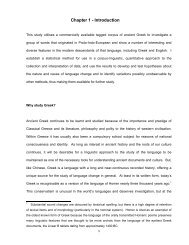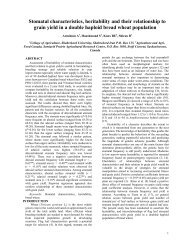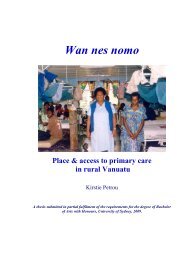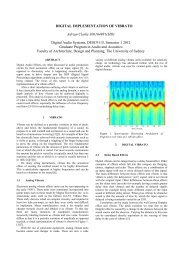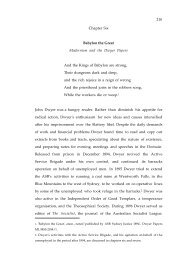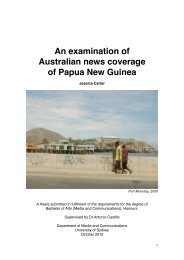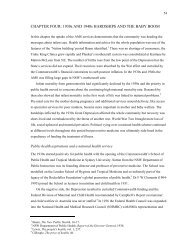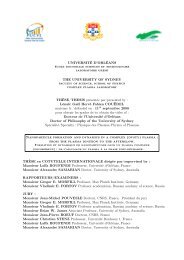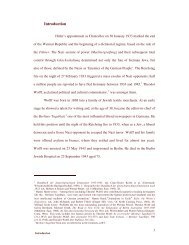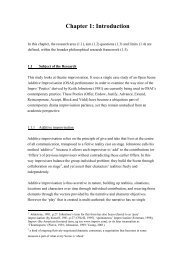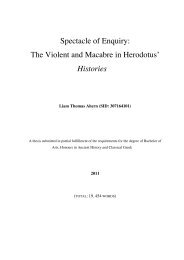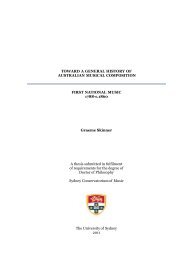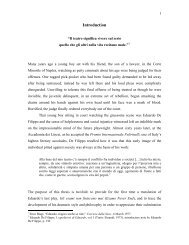journal of digital research & publishing - The Sydney eScholarship ...
journal of digital research & publishing - The Sydney eScholarship ...
journal of digital research & publishing - The Sydney eScholarship ...
Create successful ePaper yourself
Turn your PDF publications into a flip-book with our unique Google optimized e-Paper software.
1 P M J O U R N A L O F D I G I T A L R ESEARCH & P UBLISHING<br />
has arguably been partly facilitated by the increasing amount <strong>of</strong> health information<br />
accessible by the public which has previously been limited to health pr<strong>of</strong>essionals. This<br />
increasing access to information has resulted in a change to the medicalknowledge gap<br />
between health pr<strong>of</strong>essionals and the public (Hardey: 1999,2001). Lee hypothesises that the<br />
information availability <strong>of</strong> the Internet “facilitates the breakdown <strong>of</strong> health pr<strong>of</strong>essionals’<br />
monopolies over their own knowledge base” (Lee, 2008: p.451).<br />
Gerber and Eiser (2001: 2) suggest that with information from the Internet, patients<br />
“potentially have a different position in the decisionmaking process; possessing both<br />
preferences and knowledge prior to any physician contact’’, however they acknowledge<br />
that having this information does not automatically mean that the patient will want to<br />
participate in decisionmaking processes. Similarly, Segal cautions against making a<br />
direct link between information availability and the “empowered patient” (Segal, 2009),<br />
however it will be clear when this paper looks at the case <strong>of</strong> thyroid patient advocates that<br />
many <strong>of</strong> the issues surrounding consumers’ increasing access to information (including<br />
$**(%*&7D&$"D7>036$7"&5>%8$)$#$691&3>%&*$,"$453"6#9&0$"$0$*%8M&<br />
Nevertheless, it is clear that information availability is leading to a challenge <strong>of</strong> medical<br />
authority, at least in regards to the knowledge gap. Lee argues that use <strong>of</strong> the Internet<br />
“may strengthen people’s ability to question health pr<strong>of</strong>essionals and increase people’s<br />
skepticism about health pr<strong>of</strong>essionals”. (2008: p. 461).<br />
Other factors contributing to a democratisation <strong>of</strong> medical power include the ability <strong>of</strong><br />
patients to order medications on the Internet without a prescription (<strong>of</strong>ten, this is perfectly<br />
legal depending on which country the pharmacy is in and which country the recipient is in)<br />
and the ability to order diagnostic tests over the Internet in numerous countries without a<br />
doctor’s involvement. <strong>The</strong>se activities were possible before the Internet, however it is not<br />
#$H%#9&6+36&6+%9&G7(#8&+3I%&)%%"&'%>D7>0%8&7"&*(5+&3&*$,"$453"6&*53#%M<br />
Some scholars suggest that a substantial cultural shift, mainly due to the effects <strong>of</strong> the<br />
Internet, is taking place, transforming the traditional doctorpatient relationship into<br />
something more akin to a partnership in many cases (Crooks, 2006), making consumers<br />
more critical and “aware that doctors are not ‘gods’, but human beings who make errors”<br />
(Anderson, Rainey and Eysenbach, 2003: p.72). Gesler (1999: p.22) contends that “power<br />
relationships can be contested and difference can be made into a positive force for good”.<br />
Makoul (1998) developed a conceptualisation identifying two types <strong>of</strong> patients: physician<br />
reliant and selfreliant, however both <strong>of</strong> these still involve the doctor to differing extents.<br />
140




